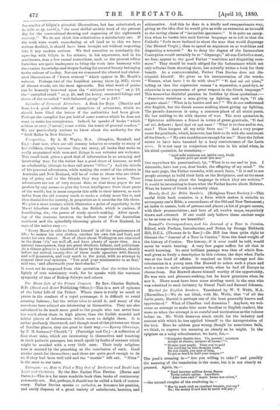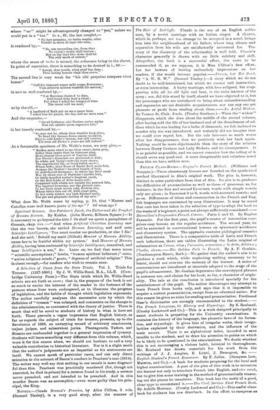Martial for English Readers. Translated by W. T. Webb, M.A.
(Macmillan.)—We do not think, with Mr. Webb, that "of all the Latin poets, Martial is perhaps one of the least generally known and appreciated." What of Claudian and Ansonius ? Anyhow, we wel- come an attempt to make him more familiar to English readers, the more so when the attempt is so careful and meritorious as the volume before us. Mr. Webb deserves much credit for the industry and success with which he has applied himself to the interpretation of the text. Here he seldom goes wrong, though he sometimes fails, we think, to express his meaning as clearly as he might. In the epigram on a noisy schoolmaster, we have, for,— " Discipnlos dimitte tuos. Pis, garrule quantum Accipis ut dames, accipere ut taceas ?"— " Dismiss your pupils. Since you're paid For carrying on this shouting trade, Do yon expect, you man of lung, To get as much to hold your tongue ?"
The poet's meaning is—" Are you willing to take ?" and possibly the meaning of the translation is the same, but it is not clearly ex pressed. Again, in,—
" Emit lacernas milibus decem Basses Tyrias colons optimi. Lucrifecit.
Adeo bone emit P' inquis. Immo non solvet,"
—the second couplet of the rendering is,— " Has he made such an excellent bargain, you say ? No; the money it cost him he never will pay ;'•
where "no" might be advantageously changed to "yes," unless we could put in a "but." In x., 61, the last couplet,—
" Sic lare perpetuo, sic turba sospite, soltts Flebilis in terra sit lapis iste taus, is rendered by,— " So, son succeeding sire, from thee No victim's death shall borrow ; But on thy land this stone shall be The only mark of sorrow," where the sense of titrba is missed, the reference being to the slave::,
in point of execution, there is something to be desired in i., 88 :—
"Accept, dear youth, what grief has done ; Thus lasting honour shalt thou crave."
The second line is very weak for "his tibi perpettto tempore vivet honor."
" Callidus imposuit nuper mihi eaupo Ravenna° ; Cum peterem mistum vendidit ille merum,"
is no t so well rendered by,— " I at Ravenna chanced to dine, And found mine host a cheat ;
For when I asked for tempered wine. The rascal sold me neat,'
as by the old,— " A landlord of Bath pat on me a queer hum. I asked him for punch, the dog sold me mere rum."
And the exquisite,— " Sic ad Lethaeas, nisi Nostore serius. uncles Non eat, optabis quem superesse tibi," is but tamely rendered by,— " So may not he, whom thou wonldst keep alive,
To hand thy lineage down among mankind, Pass to cold Lethe's stream, but still survive, Till even old Nestor's years are left behind."
As a favourable specimen of Mr. Webb's verse, we may give,— " Maiden more sweet to me than swan's-down grey,
Softer than lambs that by Galaesns play, More elegant than pearl of Lucrine shell, Nor Persia's diamonds are preferred so well ; So white. not India's new-cut ivory shows, The ungathered lily, or fresh-fallen snows ;
Whose locks' than fleece of Baetic flock more fair, Surpass the Teuton's knotted length of hair,
Or gold-furred dormouse ; to whose lips their scent Was by sweet rose of Paostum's garden lent, Or lately-handled amber's fragrant smell, Or the first-fruits of Attic honey-cell ; Compared with whom nor seemed the peacock fair, The squirrel lovesome, nor the phcenix rare. In her fresh tomb scarce cold, Erotion lies, Whom bitter fate cut off, with cruel spite, In her sixth winter, nor that finished quite, The pet and playmate darling of my oyes."
What does Mr. Webb mean by saying, p. 19, that " Mamas and Catalina were well known poets of the age" ? Of what age ?



































 Previous page
Previous page